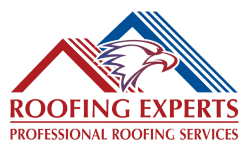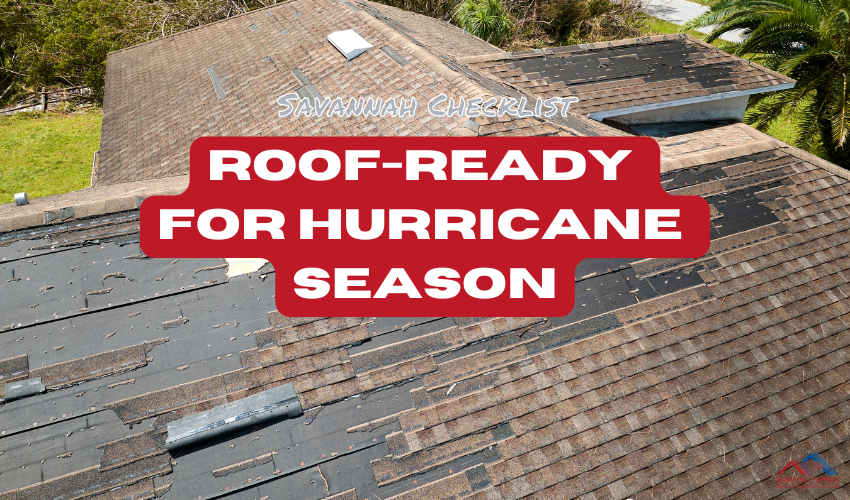Is your roof ready for the Savannah hurricane season? Each fall, hurricanes and named storms travel up the coast of the Atlantic causing issues with power, downed trees, and your home’s roof!
Most homeowners spend more time worrying about their WiFi going out than their roof caving in. But in coastal Georgia, the next squall doesn’t care if you’ve got the best asphalt shingle or a shiny new metal roof—it’s coming for every loose nail, weak seam, and unsealed vent if we see the wind and tree damage like we did in 2024.
Just ask anyone who thought a little heat, humidity, and sideways rain wouldn’t test their roof until Hurricane Matthew proved otherwise. Roof damage here isn’t a matter of if—it’s when. And calling a roofer after the storm passes costs more than checking your residential roofing now.
Please keep reading to see how a quick look over your roof can save you a fortune when coastal weather decides to prove its point. We don’t aim to scare you, but instead help inform you on ways to be proactive before hurricane season!
Quick Roof Storm Checklist:
Hey Savannah homeowners and local residents! Be sure to pin or save this quick graphic below on what to do for hurricane season to protect your roof and loved ones! ⬇️

- Do a simple ground-level roof check: Look for missing shingles, dips, rusted flashing, and overhanging branches. Five minutes today could save you thousands later.
- Spot leaks before they spread: Check attic corners, skylight seams, ceiling vents, and suspicious stains. Even small drips can ruin insulation and spike energy costs.
- Know your roof’s age and material: Old bitumen or thin 3-tab shingles fail fast in Savannah storms. Don’t guess—get a professional opinion.
- Clean your gutters like you mean it: Clogged gutters quietly push water under shingles, down walls, and into your foundation. Simple maintenance prevents expensive repairs.
- Secure every vent, cap, and flashing: Loose or unsealed roof features are where wind and rain start trouble. Fix them before hurricane season does.
- Check your warranty and insurance now: Don’t wait for damage to discover that your policy has gaps or requires proof of maintenance. A little prep protects your wallet. Be sure to learn about “Named Storm” clauses.
- Call a professional roofer for an inspection if anything feels off. A strange creak, ripple, or stain is often your roof’s warning sign. Trust your instincts and handle it before it grows. Last year we saw many homes in Southbridge and Pooler impacted by the Hurricanes of 2024 in the Savannah region!
7 Tips for Roof Prep Before Hurricanes & Storms:
1. Start With a Visual Roof Check—No Ladder Needed
Think of this as your five-minute storm defense drill. You don’t need to be a roofer or risk your neck on a ladder to spot early signs of roof damage—just step outside, take a slow walk around the house, and actually look up.
Start with the obvious: missing shingles, warped edges, rusted flashing, or strange dips in the flat roof. Even small gaps can let in water during a storm, and with Savannah’s humidity, that moisture doesn’t dry out—it festers. You’re not just preventing leaks here. You’re protecting the framing, drywall, and insulation from slow-building destruction that turns into a full-blown restoration job.
If you’ve had a recent hail storm or your home’s been around since “pre-construction boom” days, this check matters even more. Look at the tree line too. Are any limbs hanging over the roof? That’s a gamble with high winds and falling branches.
This simple routine could save you thousands in emergency roofing services—and boost your home improvement planning with actual facts instead of guesswork. In Savannah, where every roof faces sun, salt, and surprise weather, a five-minute look today might spare you a five-figure fix tomorrow.
2. Check for Leaks in the Usual (and Unusual) Places
Leaks don’t always start with a drip in the living room—they sneak in like bad habits, quiet and unnoticed until you’re knee-deep in a restoration bill. In a Savannah roof, especially one that’s weathered a few hail hits or a rough storm season, water finds the tiniest paths: attic corners, skylight seams, ceiling vents, and that odd stain behind your guest room curtain you’ve ignored since spring.
Even newer shingle roofs and metal roofs aren’t immune. One missing fastener or a dented ridge cap is enough to redirect rainwater straight into your insulation. Left alone, it damages not only structure but your home’s energy performance—and your wallet. Add that to the mix, and you’re talking reduced longevity and a fast track to major roof damage.
If you see discoloration, peeling paint, or smell mildew—don’t guess. Don’t Google. Get a proper estimate from a local expert who understands Savannah’s unique construction quirks and storm patterns.
3. Know Your Roof’s Age and Material—Not All Hold Up the Same
Some roofs are like vintage cars—cool to look at, but one storm damage away from a total breakdown. If you don’t know how old your shingle roof is or what it’s made of, you’re guessing your way through one of the most important parts of home protection. And in Savannah’s unpredictable climate, guessing gets expensive fast.
Older roofs—especially ones built with bitumen, outdated flat roof systems, or thin 3-tab shingles—weren’t designed to handle today’s extreme rain, heat, and winds. Even minor roof damage on these materials can lead to massive leaks, mold growth, or full-blown restoration jobs. On the flip side, newer materials may hold better, but only if they’ve been maintained properly. Age without maintenance is a risk. Material without durability is a liability.
If you’re not sure when your roof was last inspected—or what’s actually up there—it’s time to ask for help. A local repair crew can give you a clear read on what you’ve got and how much life is left.
4. Clean Your Gutters Like You Mean It
You can spend thousands on a new metal roof, top-tier asphalt shingle, or designer flat roof system—but if your gutters are packed with pine needles and soggy leaves, you’re still one storm away from disaster. In Coastal Georgia, where hail, heat, and salt air constantly tag-team your home, clogged gutters do more than overflow—they quietly push water under your shingles, down your siding, and into your foundation.
That’s how roof rot starts. Not with a hurricane, but with a $2 tennis ball stuck in your downspout.
Every homeowner talks about maintenance, but few treat gutter cleaning like the storm prep task it actually is. And when the next hail storm hits, overflowing gutters can turn a simple rain event into a ceiling stain, a wall tear-out, and a not-so-fun call to customer service.
5. Secure or Seal Roof Features Before the Wind Finds Them
The wind doesn’t need an open door—it just needs a weak spot. And on a Savannah roof, those weak spots often hide in plain sight: a loose vent cap, unsealed flashing, cracked skylight curb, or a satellite dish hanging on by a thread. Once the gusts pick up, what seems small becomes the start of serious roofing damage.
Asphalt shingle systems are especially prone to lifting around roof protrusions if not properly nailed and sealed. On a flat roof, ponding water can collect near unsealed features, making it even easier for wind-driven rain to work its way in. And when those components start flying off mid-storm? That’s when the real damage begins—not just to your roofing, but to whatever’s underneath.
Securing these elements isn’t just a one-time roofing checklist item—it’s part of responsible upkeep in storm-prone Savannah. So before hurricane season flexes, grab a pro or climb (safely) with sealant and a sharp eye.
6. Review Your Warranty and Insurance—Now, Not After the Storm
Your roofing warranty isn’t just a piece of paper to file away with the appliance manuals. In Coastal Georgia, it’s the difference between getting your repair covered or footing a five-figure bill alone. Too many homeowners assume their policy covers every disaster, only to find out too late that missing maintenance records or expired coverage leaves them stranded.
Start by pulling out your documents and reading every line—especially the sections on wind, water intrusion, and required inspections. Some warranties demand annual maintenance checks to stay valid. Others limit claims to certain types of damage or prorate payouts based on longevity.
And don’t forget your insurance policy. Many homeowners never realize they need photos or a recent inspection to prove storm damage wasn’t “pre-existing.” If you don’t have that documentation, the claim adjuster can deny you faster than it takes to get a free estimate.
Call your roofer, talk to your agent, and get clear on exactly what’s protected. This one step could save your savings—and protect your customer satisfaction when you need help the most. A little prep now means fewer surprises when the wind starts rattling your gutters.
7. Call for a Professional Inspection If Anything Feels “Off”
Your roof has a language all its own. A sudden creak. A soft spot near the eaves. That tiny ripple in an asphalt shingle you swear wasn’t there last spring. These aren’t small details to shrug off—they’re early warnings that something’s changing up top, and usually not for the better.
A pro inspection doesn’t just check for loose nails or curled edges. It uncovers hidden leaks, slow rot, and ventilation issues that quietly steal years off your roof’s lifespan. You might think you’re saving money by waiting, but in home improvement, delay almost always costs more in the end.
A seasoned roofer will look in the places you don’t think to check—under flashing, behind gutters, inside the attic where moisture likes to collect. They’ll also explain what you’re seeing in plain language and outline options that fit your budget. That kind of clear advice goes a long way toward customer satisfaction when storms start testing every inch of your roof.
If your gut says something feels off, trust it. A short visit from a professional now beats an emergency repair later. Your roof won’t fix itself, and ignoring the signs doesn’t make them go away.
FAQ: Storms, Hurricanes & Your Roof in Savannah
1. How can I prepare my roof for hurricane season in Savannah?
Start with a professional roof inspection to catch loose shingles, weakened flashing, or unsealed vents that could fail in high winds. Trim nearby trees, clean your gutters, and make sure your attic has proper ventilation to reduce pressure on the roof during a storm.
2. Will my insurance cover roof damage from a tropical storm or hurricane?
Most homeowner policies in Georgia do cover wind and storm damage, but it’s crucial to understand your deductible for named storms and what exclusions apply. We recommend reviewing your policy and letting us document your roof’s condition beforehand, which makes filing a claim easier if you ever need it.
3. How soon should I call after storm damage hits my roof?
Immediately. Even minor leaks can cause serious water damage or mold within days. Savannah Roofing Experts offers emergency storm response, temporary tarping, and fast repairs to protect your home while helping you navigate the insurance process.
The Verdict on Roofs & Hurricanes in Savannah –
Coastal storms don’t wait for you to get around to it. One loose shingle, one clogged gutter, or one missed warranty clause can snowball into a soaked ceiling and a week of phone calls you never wanted to make.
At Savannah Roofing Experts, we do more than just inspections—we’re here when the worst hits, too. From emergency storm damage cleanup to full roof repairs and replacements, our local team knows how to protect homes in coastal Georgia.
Don’t wing it. Call Savannah Roofing Experts for a pre-storm inspection that actually covers what matters—and know you’ve got a crew ready to handle whatever the weather leaves behind. It’s fast, local, and one less thing to stress about when the forecast turns ugly.
- Savannah Roofing Experts specialize in roofing, including metal, asphalt shingles, and commercial roofing.
- We can help with roof repairs and roof leak fixes.
- Recgonized as one of the best roofing companies in Savannah.



Comments are closed